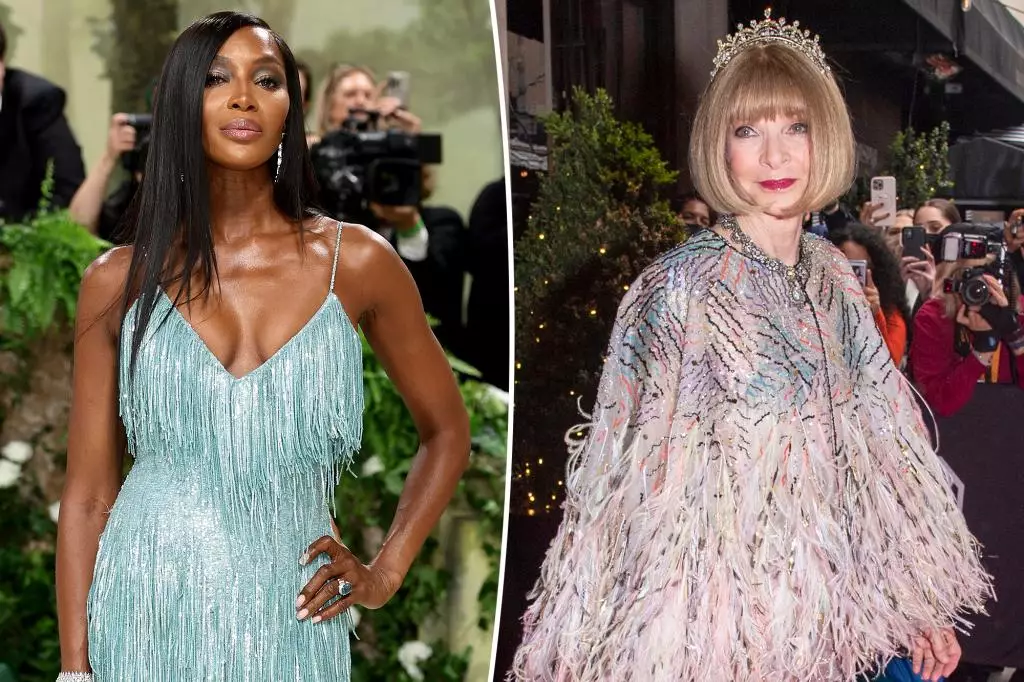Naomi Campbell’s decision to skip the 2025 Met Gala ignites an array of conversations surrounding her presence, or lack thereof, at one of the biggest nights in fashion. Though she expressed congratulations and support for the event’s theme—“Superfine: Tailoring Black Style”—her absence raises eyebrows. It reflects not only her personal choice but also deeper undercurrents in her relationship with the event’s organizer, Anna Wintour. This unfolding narrative is emblematic of a broader discussion about the dynamics within the fashion industry and the implications of personal expression in one’s public life.
The announcement came via an expressive and heartfelt Instagram post, where Campbell also managed to evoke the spirit of the late André Leon Talley, the fashion visionary who left an indelible mark on the industry. In her post, she positioned herself as part of the legacy he created, insinuating a disconnect between current fashion events and the values she feels are crucial to her identity as a Black woman in fashion. Campbell’s words convey a consciousness that extends beyond the glitzy surface of the Met Gala, inviting us to consider the real implications of representation and recognition in an industry often criticized for its exclusivity and elitism.
Rifts and Revelations: The Relationship with Anna Wintour
Recent events have hinted at a turbulent relationship between Campbell and Wintour, culminating in Wintour’s public comments about Campbell’s tardiness at a recent event. Such a public disclosure from an influential figure like Wintour—while seemingly trivial—sheds light on the power dynamics at play within elite circles. The Vogue editor’s pointed remarks suggest a perceived shift in Campbell’s standing, one that could stem from emerging trends in fashion that favor a newer generation of talent.
There is a palpable sense that Campbell refuses to be merely a figure on a magazine cover; she seeks to be an agent of change, albeit navigating a labyrinth of personal and professional relationships. The interplay of public admiration and subtle critiques she faces leaves her in a precarious position, challenging her to carve out a space that resonates with her evolving principles and values.
The Power of Representation: Black Identity in Fashion
The Met Gala, with its extravagant themes and high-profile attendees, offers a vital platform for discussions around representation and cultural identity. Campbell’s acknowledgment of the theme celebrating Black dandyism hints at a nuanced understanding of how historical contexts shape contemporary fashion narratives. By choosing to engage with the theme through her announcement—despite her physical absence—Campbell emphasizes that fashion is not merely about aesthetics; it is about voice, power, and identity.
For many in the fashion world, the Met Gala represents a pinnacle of influence, showcasing how Black creativity and individuality are integral to its evolution. Campbell’s critique, while honoring the event’s theme, suggests that mere acknowledgment is not enough. True recognition should encompass a wider understanding of history, artistry, and the voices that have often been marginalized.
Impact of Personal Relationships on Public Perception
Jodie Turner-Smith’s heartfelt comment on Campbell’s post signifies how close personal ties can influence public perception in industries as scrutinized as fashion. Turner-Smith’s expression of sadness over her friend’s absence highlights a communal aspect among Black women in the industry—a sisterhood that transcends professional rivalry but is still challenged by complex narratives of visibility and representation.
These dynamics often lead to public speculation, with fans and insiders alike eager to dissect the nuances of relationships among the high-profile attendees. Campbell’s cautious approach in navigating these spaces speaks to a reiteration of self-awareness that is increasingly vital in today’s social climate. One must question whether her absence serves to further her narrative or inadvertently reinforces the barriers she has encountered throughout her illustrious career.
Through her calculated decision to withdraw from the event, Campbell not only redefines her own relationship with the fashion industry but encourages a dialogue about the responsibilities and repercussions that come with celebrity status. Far from a simple refusal to attend, her absence resonates on multiple levels, highlighting the tensions, triumphs, and tribulations that define the narratives of Black women in fashion today.

